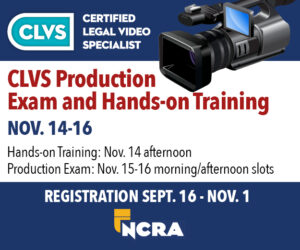By Keith Lemons
I was a lousy test-taker. I took the RPR seven times and only passed it the last time because my wife had gone to the mall in Denver and I had no ride. So I transcribed it and passed. I realized that if I wanted to pass the CRR, I had to make a plan. So this is what I did, and I passed it. Here are 10 ways to make your test-taking experience easier.
1. Buy the CRR dictation material from National Court Reporters Association. It’s the actual dictation from past CRR tests.
2. Always practice at the same time each day. I practiced from 7-7:30 a.m.
3. Limit the amount of test material to 30 minutes.
4. After writing all the tests, practice the one that feels the easiest until you write it flawlessly.
5. Start out with the easiest take in practice.
6. Alternate heavy or hard takes, a different set every other day.
7. Always end with the same easy take. The CRR is about feeling good about your writing. You already have the skill.
8. Notice there are certain phrases that occur in all the tests, like Paul Cross or trial judge or trial court. Put these phrases in your personal dictionary. Listen for them. You’ll see.
9. Drop an unfamiliar word and keep writing. One word, one error. Many words, anything you write that isn’t the word doubles the errors.
10. The test will hit a wall at about three minutes. Do not look at your screen. Focus on a point on the floor and write through it.
I did these things for 30 days straight. I passed. If you write realtime consistently, you can too.
JCR Contributing Editor Keith Lemons, RPR, CRR, is a freelancer in Brentwood, Tenn. He can be reached at k.lemons@comcast.net.
NCRA’s Certification Soup
What do all those letters behind a reporters name mean? The professionals who earned certifications like the RPR or CRR have passed skills and/or written knowledge tests that show they are adequately qualified to perform a job or tasks and that they possess advanced knowledge of issues, standards, policies and procedures, and practices specific to their professional field. Below is a brief description of the two offered by NCRA that were mentioned in the article. These two certifications test stenographic skills.
Registered Professional Reporter (RPR): The nationally recognized Registered Professional Reporter certification distinguishes stenographic court reporters considered to be among the top contributors to the profession in terms of technology, reporting practices, and professional practices. To be recognized as a RPR, candidates must pass a written knowledge test on industry best practices and a skills test that combines a challenging threshold of both speed and accuracy. RPR-certified court reporters are in high demand among the nation’s premier law firms, courthouses and other scenarios in which a reliable, accurate transcript of proceedings is required.
Certified Realtime Reporter (CRR)
The Certified Realtime Reporter (CRR) is nationally recognized as a court reporter with knowledge of cutting-edge realtime technology, proficiency, accuracy and of reporting. Realtime reporting produces an immediate transcript of proceedings by using a steno machine connected to a computer that instantly translates spoken word to text. CRRs are highly sought after because of their proven precision in reporting and high-quality realtime services. CRRs hold the RPR certification and have passed, with high accuracy, tests that include equipment set-up, accurate realtime writing, and through knowledge of realtime technology.








